Iran To Probe Disappearance Of $60 Million In Chamber Of Commerce
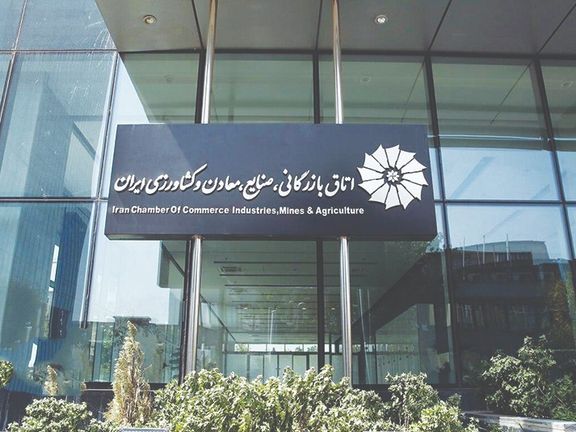
Iran's parliament has approved a plan to investigate reports about the disappearance of 15 trillion rials – around $60 million – in Iran’s Chamber of Commerce.

Iran's parliament has approved a plan to investigate reports about the disappearance of 15 trillion rials – around $60 million – in Iran’s Chamber of Commerce.
The parliament gave the go-ahead in its Tuesday session with 190 votes in favor of the move that will probe the transactions of the Iranian Chamber of Commerce, Industries, Mines and Agriculture (Iran Chamber) during the past 10 years. The Chamber is a quasi-state entity.
On Saturday, the conservative Farhikhtegan newspaper alleged that a review of documents related to the payments of 40 companies to the Chamber in the last four years indicates that a huge amount of money is not accounted for in the institution’s ledger.
In one case, the Chadormalu Mining and Industrial Company was supposed to pay the chamber about 900 billion rials but data show that only 30 billion– about one-thirtieth – was actually paid.
The chairman of the Chamber Masoud Khansari said on Tuesday that the reports are not based on accurate numbers and the Judiciary should investigate where such figures came from, describing the report as a blow to the government.
Earlier in April, the general director of a major government pension fund said that around $400 million was lost either through mismanagement or embezzlement.
Iran ranked 150 out of 180 countries in the 2021 Corruption Perceptions Index (CPI), one step lower than the previous year, which weakens its struggling economy.
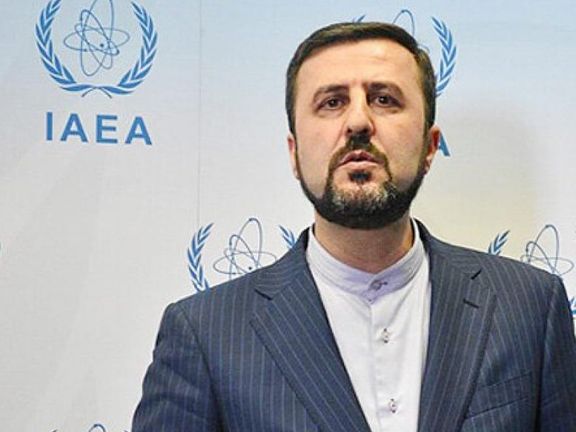
A senior Iranian human rights official has alleged Sweden is morphing into a prison for Muslims with the support of its government.
In a post on his twitter page on Tuesday, Kazem Gharibabadi, a senior Judiciary official and secretary of Iran’s High Council for Human Rights, claimed there is religious intolerance in Europe, particularly in Sweden.
Noting that “Religious intolerance is raging across Europe”, he said, “Sacrilege to religious sanctities is under no circumstances whatsoever acceptable”.
“Seems they’ve missed Medieval Inquisition!”, he quipped.
The Islamic Republic has been long accused by United Nations experts and human rights organizations of persecuting religious minorities.
On Sunday, Iran’s Foreign Ministry summonedthe Swedish chargé d'affaires to protest the burning of a Quran in Sweden by Rasmus Paludan, the leader of Danish far-right political party Stram Kurs (Hard Line).
Paludan went to an open public space in a heavily Muslim-populated neighborhood on Thursday, put the Quran down on the ground and burned it while ignoring protests from onlookers.
Since Thursday, several cities across Sweden, such as the Stockholm suburb of Rinkeby as well as in the cities -- were scenes of riots by Muslims and violent clashes, with social media videos showing young men smashing windows of police cars and setting them on fire.
Several people from pro-Paludan protesters and counter-protesters as well as police forces have been injured and dozens of arrests were made by the Swedish police that seems to be struggling to control the unrest.

The cost of internet subscription in Iran has gone up by up to 60 percent, limiting access to information and potentially harming million of online businesses..
Internet providers recently increased the cost of their services by between 60 to 100 percent. According to Tehran Municipality's Hamshahri newspaper, only days after the hike in the price of broadband, mobile operators scrapped all six and 12-month subscription packages and have only more expensive 90-day packages on offer now.
The subscription cost increase comes at a time when inflation is around 40 percent and food prices have risen by more than 60 percent in one year. The budget of fixed-income Iranians is stretched thin and many have cut down even on food purchases.
Last summer during his election campaign, President Ebrahim Raisi said his government would make broadband free to lower income families but so far has not delivered on the promise. His telecommunications minister, Eisa Zarepour, on March 22 promised adjustments to the cost of broadband would be done with consideration so that it would not add pressure to the other pressures people were under due to the high inflation.
Many also complain that despite higher costs, the speed of broadband has also gone down. Zarepour on Monday admitted that broadband speed in Iran is low due to lack of infrastructure development in the past few years. Iran ranks between 140 to 150 in broadband speed and 70 to 80 in mobile internet speed globally, he said.
Most Iranians use mobile internet rather than broadband. According to the latest figures published by the government, there are 10.6 million broadband and 84.1 million mobile internet subscribers.
Around 1.7 million small businesses, employing 7-8 million people, rely on online commerce, which can decline if internet subscriptions or usage decline.
Some Iranian media, such as conservative Entekhab, have alleged that the hike in the cost of access to the internet may be an attempt to reduce people's access to the internet. Entekhab called the hike the "silent implementation" of Siyanat (Protection) bill. The controversial bill, ironically titled Legislation to Protect Cyberspace Users’ Rights, critics say, is meant to enforce restrictions on the internet and foreign social media platforms.
If passed, the legislation currently under review would require foreign and domestic social-media networks and messaging applications to register with a regulatory and supervisory body that would include representatives of intelligence organizations. The ministry of communications and information technology would be charged with blocking any social networks or messaging applications that failed to gain approval.
Hardliners are adamant the bill should pass the parliament. Ahmad Alamolhoda, a senior firebrand cleric who is Supreme Leader Ali Khamenei's representative in Khorasan-e Razavi Province, on April 8 strongly criticized the parliament for delaying the approval of the controversial bill. "The enemy is at our throat [on social media] and you constantly dilly-dally. What are you waiting for?" he said in his Friday prayer sermon.
Some of the bill’s supporters argue Iran should emulate China's in creating a national intranet. "The Chinese have unique and innovative experience in this field, which we can put to use," lawmaker Ali Yazdikhah said January 18. China uses its ‘Great Firewall,’ a fortified digital border, to manage access to information entering and exiting the country through the Internet.
Iran has been heavily restricting access to the Internet for the past 20 years. Many foreign and Iranian websites, including media websites, are already blocked in Iran although controls are readily sidestepped by VPNs (virtual private networks) and anti-filtering software. While Instagram is the only major social-media platform not blocked in Iran, millions of Iranians use Facebook, Twitter, YouTube, and WhatsApp.
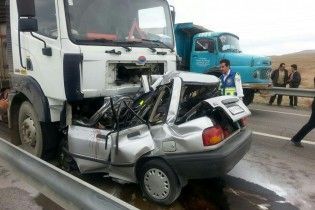
Iran’s traffic police have criticized Iranian automakers for producing low-quality vehicles responsible for a high rate of road accident casualties.
The deputy head of Iran's traffic police Teymour Hosseini said on Monday that the Iranian-manufactured cars increase the number of deadly accidents and cost the country billions of dollars of capital. He blamed the low-quality of these vehicles on government-sanctioned monopoly that local automakers enjoy.
Hosseini added that the quality of Iranian cars have a “galactic” gap with the global standards, saying that it would be "very cost-effective" for the country if the managers and employees of Iran's two largest carmakers just "stay at home".
Hosseini said the era when automakers could make small changes and call the result a new car has long passed.
Many Iranian officials and authorities, including President Ebrahim Raisi, are critical of the local car industry, with pundits blaming a “mafia-like” influential group behind a ban on car imports to eliminate competition.
Traffic police chief Kamal Hadianfar once described Iranian cars as “death wagons”, and criticized manufacturers for importing parts from China, saying there is no effective quality control.
Iran's automotive industry, the county’s largest after oil and gas, employs 700,000 workers.
With around 20,000 annual deaths, Iran has a poor traffic safety record. According to World Health Organization (WHO) data published in 2018, road traffic accident deaths in Iran reached 21,831 or 6.5 percent of all fatalities.
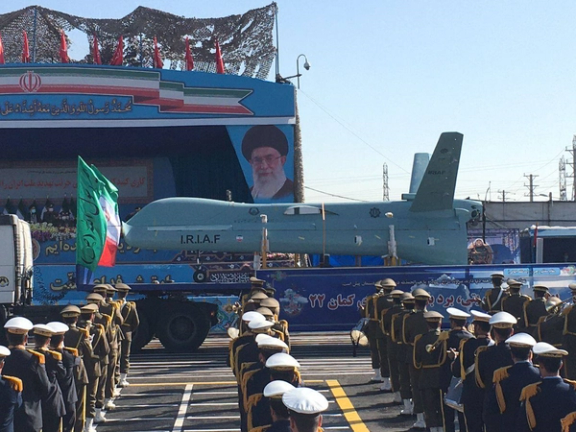
Iran showcased some of its latest drones Monday on Army Day, including the "strategic multi-functional combat drone" Kaman-22 and the single-engine multirole tactical drone Ababil-5.
Kaman-22, unveiled on February 24, 2021, was displayed at the Army Day parade in Tehran. The unmanned combat aerial vehicle is said have a range of around 3,000km (1,900 miles) and carry a 300kg load, flying up to an altitude of 8km with a flight duration of over 24 hours. Ababil-5 is the newest variant of the HESA Ababil family of drones, now equipped with four to six Almas (meaning ‘diamond’) missiles and an aerodynamic body design.
The US and Israel pioneered the use of drones in the Middle East, although China has now become a major supplier, selling to Egypt, Iraq, Saudi Arabia, and the United Arab Emirates. Iran and Turkey have developed indigenous production.
As well as 50 models of drones, tanks and other items, Army Day parade featured radar and missile systems, armored units, helicopters, fighters, air-defense systems, and naval equipment. During the parade, President Ebrahim Raisi warned Israel that Iran would strike back in response to "the slightest move against our nation.”

Relations between Iran's president and parliament are not as smooth as many had expected in June 2021 when conservatives came to dominate both institutions.
According To Jahan-e Sanaat newspaper in Tehran, disagreements between parliament (Majles) and President Ebrahim Raisi are mainly in four areas: A controversial petrochemical plant, a bill to restrict internet access, discontinuing cheap dollars for essential imports and the motions planned by a sizeable group of lawmakers to unseat Raisi's economic ministers.
The petrochemical plant, that is still being built despite strong opposition by Raisi and his Interior Minister Ahmad Vahidi, is a project that has faced strong opposition by locals and environmentalists. The location in northern Iran by the Caspian Sea is near a natural reserve which is ecologically vulnerable, and the area is too densely populated for a project whose first outcome for the region will be pollution.
Widespread opposition to the project has reached a sensitive point as media has revealed that the man behind the project is allegedly a corrupt individual who has borrowed money from state banks under two different identities and has refused to pay back a $50-million loan after many years.
The only top official who has supported the project in public is Majles Speaker Mohammad Bagher Ghalibaf who is now quietly at loggerheads with Raisi over the issue.
The second area of disagreement is a bill to restrict internet access which particularly targets foreign social media platforms. The bill is ironically called "The Protection Bill" as its advocates claim that is meant to protect users from the perils of social media.
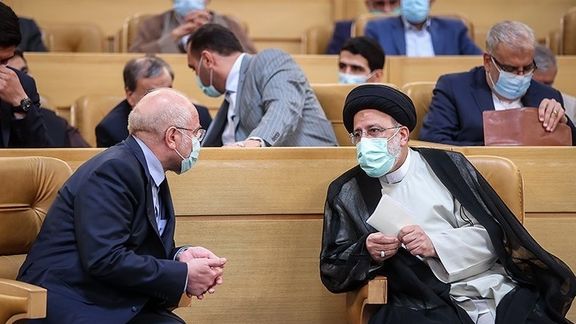
Raisi opposes the bill mainly because he knows that there are 1.7 million small businesses active on Instagram that provide jobs to around nine million Iranians. Banning access to social media will add those nine million to millions of other hungry bellies Raisi has to feed.
Some have said that Raisi also knows the country still lacks the infrastructure to replace the Internet with a local intranet network. So, he fears that the state’s administrative, financial and health systems as well as many public services might collapse and create even more problems for a government that already faces a host of hard issues.
The third disagreement between the Majles and the administration is the preferential rate of 42,000 rials per US dollar allocated for importing essential food and medicine. Lawmakers, who have come on board claiming to be revolutionaries, believe this is the only area they can have an impact by cutting a major source of potential corruption by individuals who have misused the cheap dollars to make profits in businesses that have nothing to do with essential imports.
Here too, Raisi knows that cutting off the subsidy will further increase the cost of living and will land his administration in trouble by creating the risk of street protests.
Finally, is the motion planned by over 50 of parliament's lawmakers to impeach Raisi's economic ministers including Industry Minister Reza Fatemi Amin and Labor Minister Hojjat Abdolmaleki who are believed to be his most vulnerable aides. Political circles in Tehran seem to be quite certain that the industry minister will be leaving the administration during the coming weeks.
These are only the main outstanding problems between the Majles and Raisi. Other problems such as the claim by some lawmakers that the administration has kept them in the dark about the nuclear negotiations also make matters worse, if lawmakers conclude that Raisi is in a weak position.